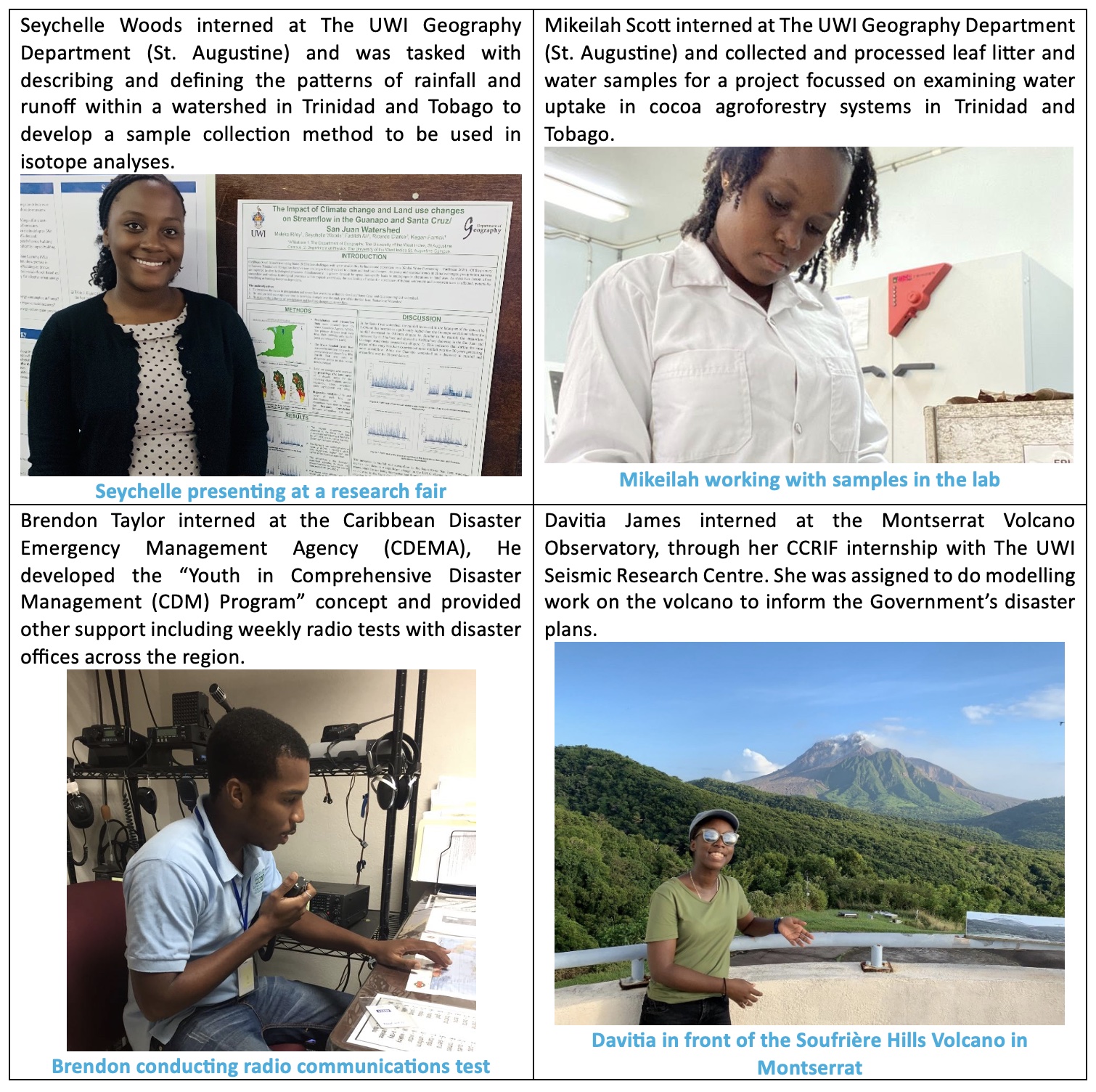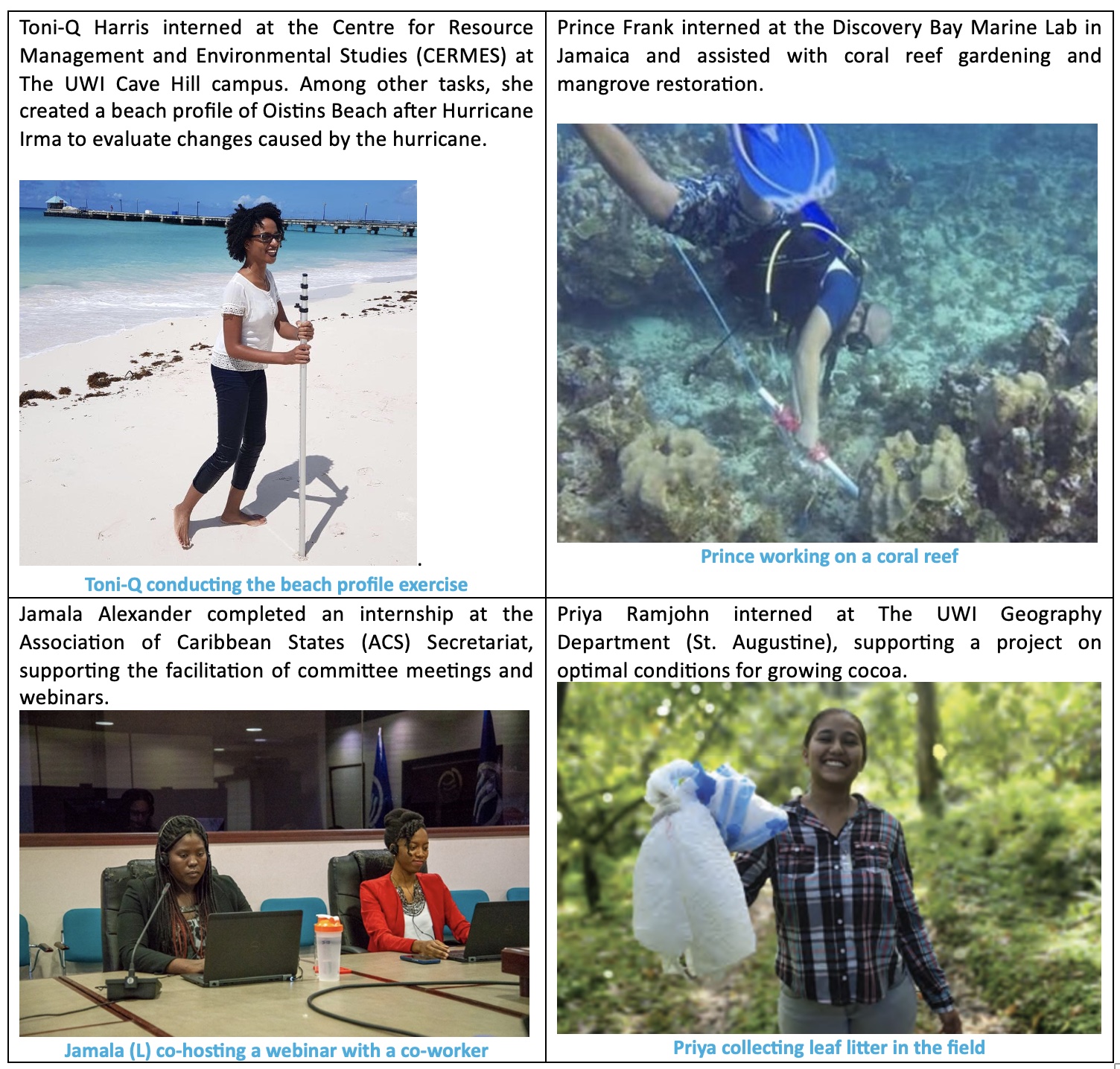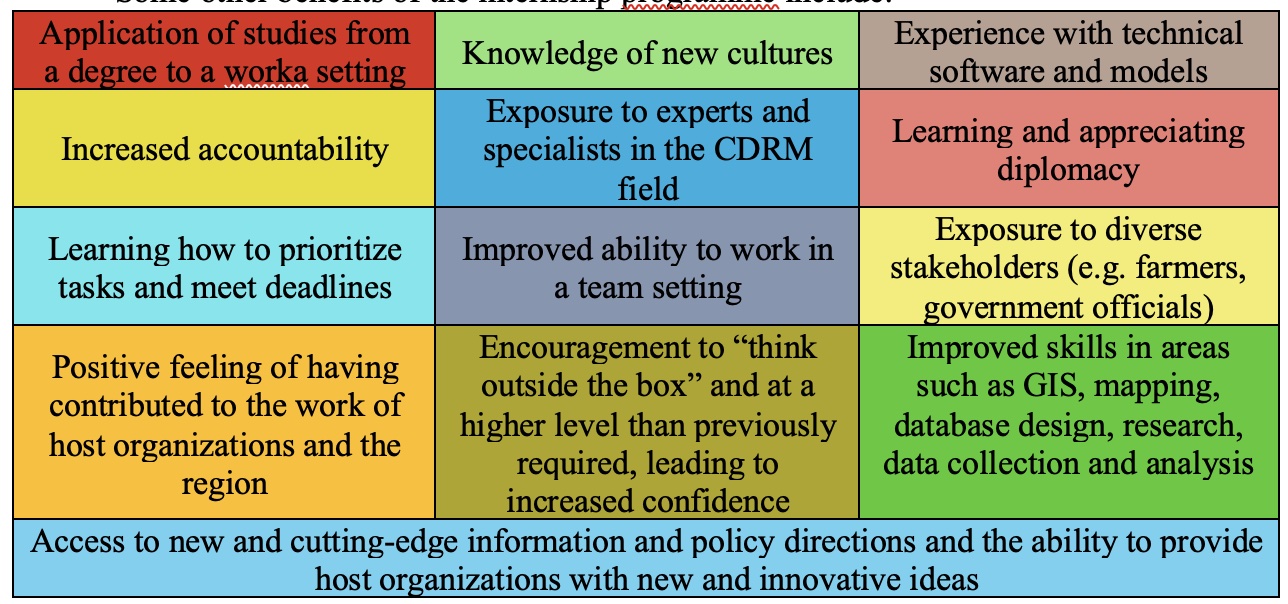The CCRIF Regional Internship programme is designed to provide young adults with the opportunity to integrate their academic knowledge with the world of work. To do this, CCRIF partners with regional and national organizations, academic institutions and civil society organizations that engage in work programmes that are aligned with CCRIF’s mandate and focus on comprehensive disaster risk management, climate change, meteorology, and environmental sustainability among others to host these young persons, providing them with invaluable work experience.
The CCRIF Regional Internship Programme was launched in 2015.
- Citizens of either CARICOM or CCRIF member countries in the Caribbean can apply. Preference is given to young adults between the ages of 21 and 28.
- Graduates (with at least a bachelor’s degree) from a recognized university who have completed a course of study in any one of the following key areas of study including but not limited to:
- Disaster risk management
- Disaster risk financing
- Environmental/natural resource management
- Meteorology
- Climate studies
- Civil engineering or civil with environmental engineering
- Management studies with a focus on risk management
- Environmental economics
- Environmental/natural resource management
- Geography/geology
- Actuarial science
- Public financial management
Preference may be given to applicants who are recipients of a CCRIF-UWI Scholarship or a CCRIF Scholarship.
CCRIF interns work on a variety of projects based on the requirements of host organizations. Some examples of the projects that previous interns have worked on include:
- Preparing a readiness proposal to access the Green Climate Fund (GCF)
- Investigating the inclusion of persons with disabilities in DRM
- Improving the state of readiness of the CDEMA Coordinating Unit and the CDEMA Participating States for the 2017 Hurricane Season
- Developing a systematic review of drivers of farmland abandonment
- Developing draft country disaster risk reduction profiles
- Micro-zonation project on hazard levels within the exclusion zone of Soufrière Hills
- Mangrove Forest Baseline Studies for Conservation and Rehabilitation
- Examining the economic costs of the October 2018 flood in Trinidad and Tobago
- Economic valuation of fisheries and aquaculture infrastructure
Other examples are shown below.


To support the completion of their internship projects, interns can expect to undertake a range of activities including:
- Participating in fieldwork
- Conducting literature reviews and web-based research
- Developing Geographic Information System (GIS) outputs
- Writing up meeting/conference/seminar notes and reports
- Compilation of data/information and using it for empirical analysis
- Assisting with the planning and organization of events
- Assisting with policy-influencing work
- Conducting surveys
- Supporting the organization of conferences and workshops
- Participating in stakeholder consultations
- Undertaking research to support proposal development and other technical papers
CCRIF Interns are placed at organizations based on the project requirements specified by the host organizations and the qualifications, experience, and skills of the applicant. Former host organizations include, among others:
- National disaster offices in CCRIF Caribbean member countries - for example, the Office of Disaster Preparedness and Management (ODPM) in Trinidad & Tobago, and the Office of Disaster Preparedness and Emergency Management (ODPEM) in Jamaica
- National meteorological agencies in CCRIF Caribbean member countries
- Association of Caribbean States (ACS) Secretariat
- Caribbean Centre for Development Administration (CARICAD)
- Caribbean Community Climate Change Centre (CCCCC)
- Caribbean Development Bank (CDB)
- Caribbean Disaster Emergency Management Agency (CDEMA)
- Caribbean Institute for Meteorology and Hydrology (CIMH)
- Caribbean Meteorological Organization (CMO)
- Caribbean Regional Fisheries Mechanism (CRFM) Secretariat
- CARICOM Secretariat
- CCRIF SPC
- Organisation of Eastern Caribbean States (OECS) Commission
- The University of the West Indies (The UWI) – various departments and centres at the Cave Hill, Mona, and St. Augustine campuses
No. The internship programme has been developed to provide young adults with work experience. CCRIF is of the view that internships are a core component of students’ academic and professional journeys, acting as the intersection of the two. It is through internships that students are actively engaged in the concepts and theories that they learn in the classroom and put their education into practice. It is also the mechanism for career discovery and self-discovery. CCRIF prides itself in giving young graduates the opportunity to gain valuable applied experience and make connections in professional fields they are considering for their career paths.
The CCRIF Internship Programme benefits young adults by:
- Allowing them to acquire new learning through challenging and meaningful activities and tasks while also pushing them to develop self-understanding, self-discipline, maturity, and confidence in the workplace.
- Promoting academic, career and personal development.
- Providing experiential learning thereby ensuring that they gain vital skills and experience that they will be able to use throughout their professional career.
- Exposing them to the work being undertaken in the region in areas such as disaster risk management, climate change, and risk transfer.
- Providing them with the opportunity to develop strong networking/mentoring relationships.
Some other benefits of the internship programme include:

Between the launch of the Programme in 2015 and 2023, 171 young adults from 11 Caribbean countries have been placed in 36 host organizations. CCRIF has invested over US$460,000 in its internship programme.
Applications must be submitted via the CCRIF online internship application platform at: https://www.ccrif.org/regional-internship-programme no later than the deadline.
The deadline is stated on this website.
All applicants must submit a:
- Complete application form
- Curriculum vitae (CV) or resume
- Copy of undergraduate degree or transcript
- Copy of postgraduate degree – if applicable
- Proof of citizenship (copy of passport or national identity document with valid dates)
- Passport-size photograph
Applicants must also provide the following letters of reference:
- One report from an academic referee at the university level attesting to the applicant’s academic ability and potential
- A second report from an academic referee at the university level
or
a professional reference from a former employer, a project supervisor, or supervisor for volunteer activities – this should attest to the applicant’s skills, professional demeanour, and contributions to the institution, project, or activity.
Referees must submit these letters of reference to the following email address: internshipapplications@ccrif.org. Details on how these should be submitted can be found on the CCRIF website at: https://www.ccrif.org/regional-internship-programme
CCRIF internships can be either on-site or virtual.
Interns are placed in host organizations for a period of 8 to 10 weeks. The CCRIF Internship Programme usually runs from June to December each year.
All interns are provided a stipend averaging US$800 – US$1,000 per month. Interns who are placed outside of their home country are provided with return airfare, a stipend for housing, as well as medical insurance. Stipends are paid directly to the intern’s bank account via international wire transfer.
Host organizations will assist the interns who are placed outside of their home country to find suitable accommodation. Organizations usually share a list of accommodation options with the interns once they have signed their internship agreement.
No, on-the-ground transportation and accommodation are not provided for CCRIF Interns placed within their home country, except if the distance between their home and place of work is an unreasonably far distance.
All interns must sign an internship agreement with CCRIF.
All interns must agree to and follow the Code of Conduct, which requires interns to:
- Apply themself and diligently implement the duties assigned to them.
- Keep confidential all information of the host organization that comes into their possession.
- Understand that any intellectual property they may develop while performing their duties belong to the host organization and is not theirs to share or use outside of the host organization, except if given written permission.
- Conduct themselves in a manner that upholds the interests of CCRIF and the host organization.
All interns must also participate in:
- An introductory online intern forum hosted by CCRIF prior to the start date of their placement with the host organization.
- The CCRIF-UWI online summer course titled, “Introduction to Disaster Risk Financing and CCRIF Parametric Insurance” which upon successful completion they receive a UWI/CCRIF certificate and 2 continuing education units.
- An end-of-internship forum
Interns are required to:
- Develop a work plan in collaboration with the host organization that outlines their tasks and assignments for the period of the internship.
- Provide CCRIF with a summary report of their internship experience, photographs, and a short video that demonstrates aspects of their work and describes the internship experience.
Once the intern has provided all deliverables and participated in the required forums, the intern will be provided with a Certificate of Completion.
Interns typically work five days a week on a full-time basis in the host organization. The working hours are expected to be 8 hours per day and the actual times are determined by the host organization.
Interns should initially alert their supervisor of any emergency or if they need on-the-ground support. They are also asked to send an email to the CCRIF Technical Assistance Team at technicalassistance@ccrif.org.
CCRIF Interns can email the CCRIF Technical Assistance Team at technicalassistance@ccrif.org with any queries. CCRIF Interns should reach out to their supervisor with questions about their work assignments.
Only after successfully completing the internship and receiving a certificate of completion from CCRIF will the intern be allowed to share information about their internship on social media platforms or include on their CVs.
Yes. The internship can be extended by mutual agreement between the host organization and intern at no additional cost to CCRIF and with the assurance that the host organization will provide equivalent or higher remuneration to the intern for the period of the extension. This agreement, if put into force, will need to be communicated to CCRIF.
There is no expectation that the host organization will employ the CCRIF intern. However, this has occurred in a few cases where interns have been hired and given posts within the host organization.

